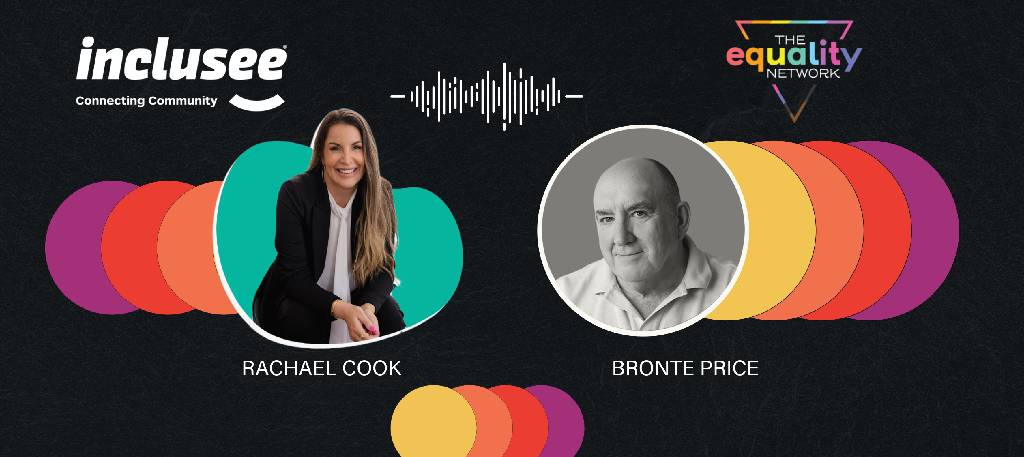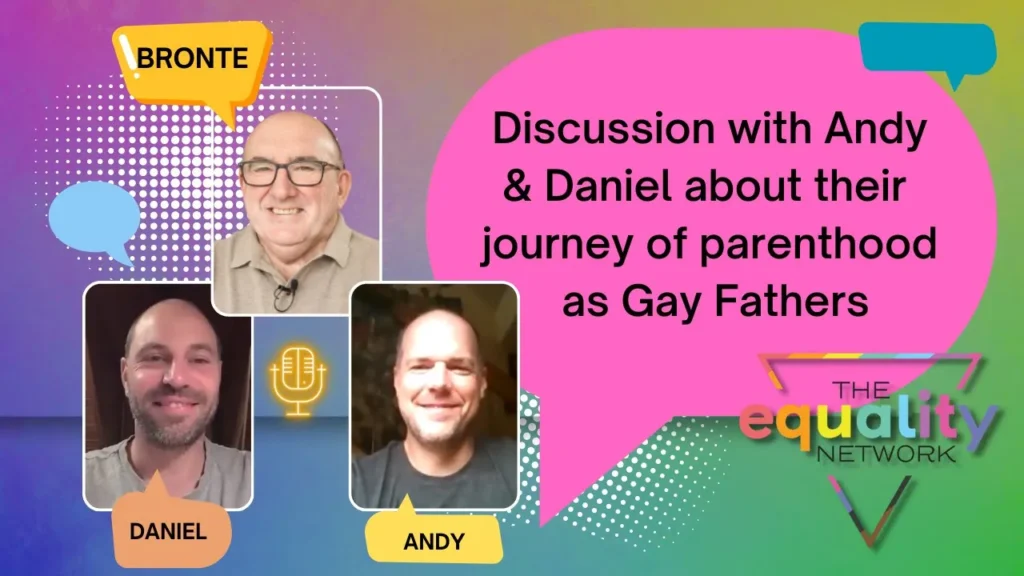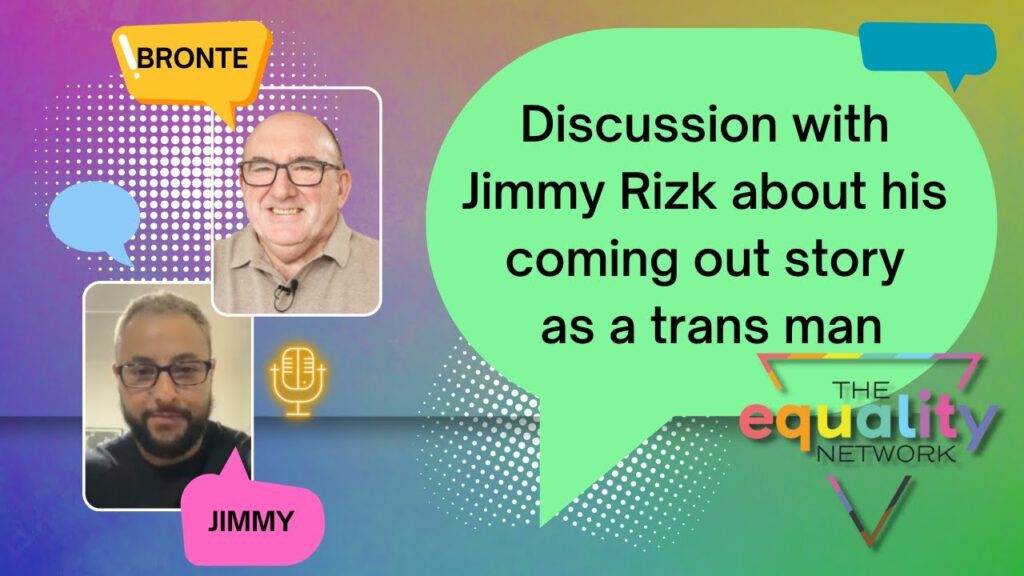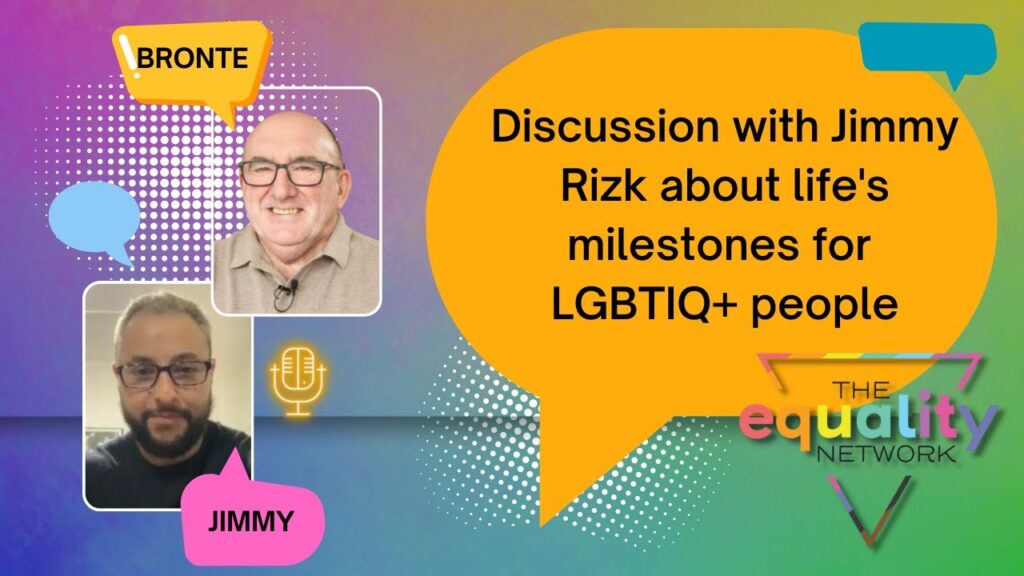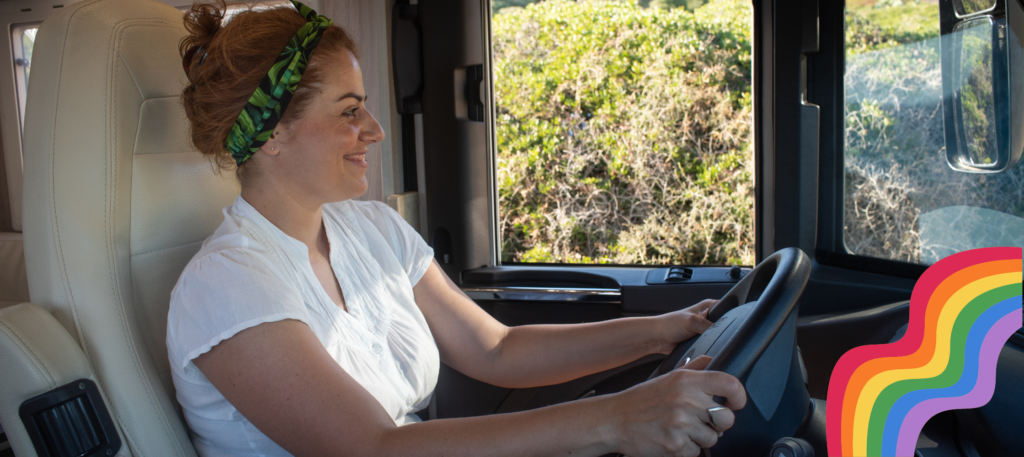Discussion with Andy & Bonita about LGBTIQA+ End of Life Care, Death Care and Funerals
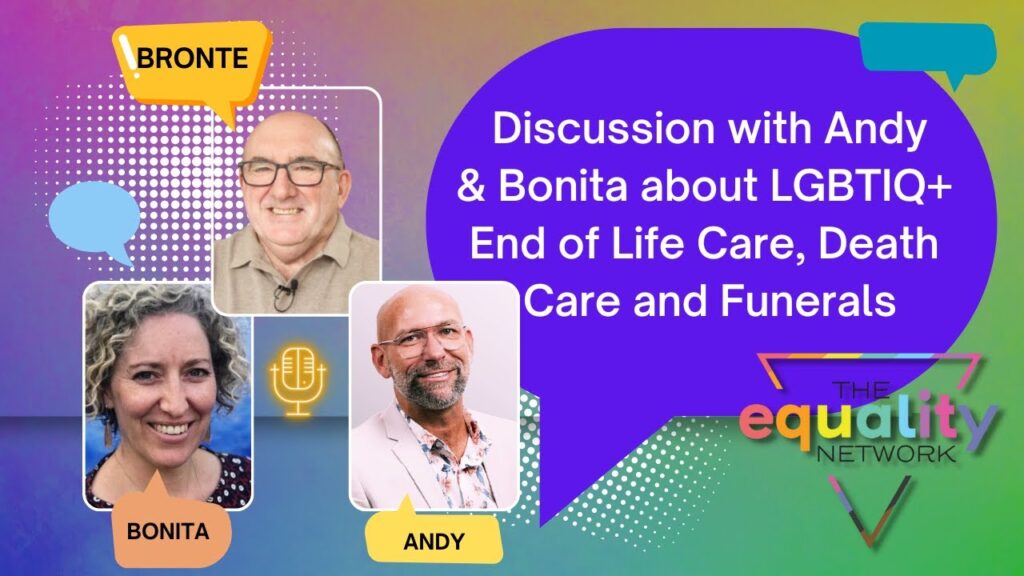
As LGBTIQA+ people draw towards the end of their life, they begin to contemplate what will happen as they are near death. What will happen after they die? Will they be in safe hands? Will they be able to celebrate their life in an authentic way? What changes need to happen in the funeral industry for that to occur?
Watch the full video of the interview to listen to the whole discussion with Bonita Ralph (an independent funeral director) and Andy Fernie (a bisexual funeral director).
The key topics discussed in this interview were these:
- Please tell us a little about yourself and your involvement in the funeral industry.
- How many funerals of queer people do you know of that have taken place in the past 12 months?
- How many ‘queer funerals’ do you know of that have taken place in the past 12 months?
- Why do you think funeral companies have lagged behind in offering queer funerals?
- Is there a fear, do you think, that if funeral companies openly support LGBTIQA+ people, it will affect their brand? Or do they believe they are currently treating everyone the same and, therefore, are inclusive?
- How can funeral companies better cater to the needs of LGBTIQ clients?
- What are the first things funeral companies need to do, to fix the gap?
- Do funeral companies make it easy for LGBTIQA+ people to come out?
- Tell us about some of the more challenging – even inappropriate – scenarios that have happened or could happen at queer funerals and how they might be handled respectfully.
- Why do some LGBTIQA+ people fear seeking deathcare?
- What are the fears of LGBTIQA+ people toward end of life – how does that affect workplaces and businesses?
- Being forced back into the closet – is that reality for some, when they seek End of Life care? How does it impact on those people?
- If you could arrange the perfect funeral for an LGBTIQA+ person, what would it look like if we hovered over it?
Transcript of the interview with Andy & Bonita about LGBTIQA+ End of Life Care, Death Care and Funerals
Bronte: Hi, everyone. Welcome to this next Safe Space conversational chat. I’m Bronte Price, and I’m the founder of The Equality Network. And as you know, we run a series of regular chats with specialists in the fields about all sorts of issues, matters, questions, queries that affect the LGBTIQA+ community.
And tonight, we turn to death and dying and death care and how well the funeral industry as it currently stands – works to help or not LGBTIQ people as they draw towards the end of their life. And as they do that, as much as anyone else, they contemplate what’s going to happen as they come closer and closer to death.
What will happen after they die? Will they be in safe hands? Will they be able to be able to be a celebration of their life in an authentic way? And perhaps we’ll have a look also, of course, at what kind of things need to happen in the death and dying and funeral space for all of that to occur.
So it’s my pleasure tonight to be joined by two specialists in that field. So I’ll happily introduce Bonita Ralph and Andy Ferni. And I’ll get you both, if you will. Bonita starting first just to introduce yourself, talk a little bit about yourself.
Bonita: Thanks, Bronte. So, my name is Bonita, and I’m gender woman and an ally in the queer community. I have a gay sibling and I have my chosen family are full of beautiful queer folks. So I feel yeah lovely. Lovely and connected. And I have what?
Do you want me to talk about the funeral straight away? Get into that sort of work. In my introduction.
Bronte: No, I’ll come in here. You’re working?
Bonita: Yeah, sure.
Bonita: So I am coming from a background in community services and supporting families and young people. And in the last six years, I found myself being drawn to and working in the funeral care space. And the last four years, roughly being a funeral director, caring for families. And I mostly worked in the pediatric and infant care space, but also care for people across the community.
Yeah! So, it’s been an amazing journey. I’ve just finished up in that career path and I’ve just deviated somewhere else, but still in the end-of-life space and supporting people in the community. Yeah.
Bronte: Andy, tell us a bit about yourself, please.
Andy: Thanks, Bronte. I’m Andy, a cis male that identifies as pansexual. So how did I get into space? Funny story. During COVID like, my mum had been diagnosed prior to COVID with advanced Alzheimer’s and I was in charge of sorting everything out in relation to a funeral.
So, just before COVID got the funeral, the family was involved in organizing the funeral and I went out there and I made a number of calls and I wanted something environmental because I love the environment.
I rang around, I actually caught up with a friend that’s a celebrant, actually. And she pointed me to a few different places. And I was actually shocked at how when I met with these people, how my mother was being spoken to or spoken about like she’s a transaction.
And I wanted something green, I wanted something personal. And I went through this list and then I came across my mentor who mentored me to become a funeral director, who was very personalized and spoke about my mom like she was a human.
And from that experience, I was looking for something to do at the time, just before COVID and I asked this particular person if it would be okay if they could mentor me and teach me.
And that’s what she did. And here I am today, a funeral director with my business. And my area of differentiation that I really wanted to focus on was the environment. I’m now planning, that I’m going to my space, into the queer space, which I’m very happy about because there’s not a lot of representation from someone who has their own business that actually is queer.
So that’s sort of in a short space how I got to where I am.
Bronte: Thank you. And I wanted to go straight to that point. I think. Because if we think about the number of queer funerals. Not the funerals of queer people. But queer funerals that we’ve been to or that we know of over the past one year or two years and if we coupled that also with the number of queer people who are working in the death and dying and funeral industry. My own experience of that is that there are few of those that’re happening. But they’re very few and far between. Does that reflect your experience, Andy?
Andy: Absolutely. Since we met and we were introduced, I’ve done a lot of research in that space, and yeah, no, there’s not a lot. There’s a lot of the bigger players now wanting to find a queer person to employ so that they can say they’re queer box. But to me is. Yes. You’re going to get a better service than if you are queer and or someone that passes queer and queer family looking for a service, yes. You’re going to get a better understanding by that person that is queer that’s being employed but that’s very different than if you’re actually a business that’s run by someone that’s queer. I believe.
Bronte: Bonita, your thoughts on that?
Bonita: Yeah, I think there’s just not enough diversity, there’s not enough real representation of people in the workforce and in service provision. I think it’s pretty obvious. Yeah. And I think it’s not like what we were saying in Andy about just employing someone. That’s just insulting. If you just unemploy someone based on their sexual orientation or gender or anything like that, you don’t do that, you just can’t. That’s great and it’s not helpful.
Bronte: No, you come across as being a bit tokenistic and like you said, I think earlier Bonita, just tick a box and they’ve done queer people.
Bonita: It doesn’t mean they might not be the right person for the job. There’s a whole lot of community yeah, look, everyone’s diverse people, families, yeah. And it works both ways. It’s not to say that they can’t be represented because anybody can do that job, it’s actually that has to be fair and reasonable yeah.
Andy: And there’s got to be an identification.
Bonita: I think genuine engagement, genuine connection.
Bronte: Thank you. And some education and possibly some greater lift experience across the whole spectrum, it seems to me the funeral companies have lagged behind offering queer funerals so we know that for goodness sake, hovering around 10% to 12% of the population is queer. And yet I could literally count on one hand the number of queer funerals that I’ve been to. Not funerals of queer people, but funerals that actually reflected in an authentic way, the way that person had their set of values and with their life. So my question, I guess, is why do you think funeral companies have lagged so much and for so long in offering big funerals to queer people?
Andy: Do you want to go first, Bonita?
Bonita: No, you go!
Andy: I think that historically, from what I understand around the industry, is that I think it’s 63% or 64% of all funeral brands are owned by corporates, and don’t quote me on that because I’m just pulling that figure out but I think it’s a high number, very close to 70 or thereabouts and I think that you know life’s changing, business is changing and I think that the demand for that like when we think about a funeral, majority of people, thankfully, that I’ve had to deal with have been an elderly that um you know it’s not like… If you look at the queer Community now because going to University as I’m hanging out with 30-year-olds and I’m 54 and I’m loving hanging out with 30-year-olds on average that’s their age it could be some are as young as 20. It’s really interesting they don’t, I’ve seen, I was reflecting on this before we met today that it’s almost like sexuality for them isn’t a big deal like whereas my age group and above, sexuality is a big deal still and which is a reflection of the conditioning and them growing up when people are growing up at certain times but I think that to answer your question, Bronte, that over the next 10-15 years, we’re going to see a much greater demand for queer funerals and I think that that’s gonna bring that 70% of corporates that own the brands that want to drive into that space but it’s very hard to drive into that space if you don’t really belong to that space.
Bronte: Thank you! Bonita?
Bonita: From what I have seen and this is a broad statement and I fully appreciate what I’m about to say but it’s an uneducated and unregulated industry and there’s no need to invest in that stuff. So, that that’s what I think.
I think in private business and private sector corporate, it’s not a corporate that is like a utility company or a bank that has to be seen to be doing those good community things and getting striving for better practice or care of their staff or I think it’s part of the death-denying culture.
So I think people on a big broad scale don’t want to talk about death and dying so the industry has no accountability or very little accountability and so therefore there’s no minimum standards. There’s no striving to have care standards or working standards even. You know, there’s a whole lot around the industry that could do with a lot of work and but it’s not going to happen until people value death and dying and so it’s sort of.
And the queer community is one of those reasons in there too as to why we need to value this space. We need to value the staff and and the service that they provide to make it better for the community and for it to respond to communities needs. And definitely, that is changing because people are more discerning in their choice as a consumer and they want more options like the fact that you were ringing around Andy trying to look for something, that’s happening more and more and that’s great because that’s really the only way it’s going to change. These people will demand, hey know what they what isn’t what is available to them and how to use that and get the service that they want.
Bronte: And I’m thinking that that word demand is tied up with discerning. They’ve been tired of just the same old no matter who, that coughing all that kind of.
Bonita: It’s deeply– if we want to look at grief and bereavement as well on a spectrum, I know I haven’t got a PhD in it but I know from working with families and people, you have to have good end-of-life care. And even and after death care to help along the grief and bereavement process. It’s not that you have good palliative care and then you just smash out a funeral in four days and then you get on with grieving, that is they’re all connected and that’s coming back to that denying of the end of life, the very end, the death and the after-death care needs to be valued more particularly again in this space when people are incredibly vulnerable. Yeah um and they have to go back in the closet like the older folks and when we see in aged care.
Bronte: And palliative care!
Bonita: And palliative care and the hospital and just in medical settings. Even if you’re just having a procedure, yeah you know who’s your next of kin well that can be a really complicated answer.
Bronte: Yeah yeah, that’s right! I want to go back to the funeral companies and I wonder whether because I’ve heard this from someone whether it’s if we offer support to the whole queer community, LGBTIQA+ community, it’s going to affect their brand what will other people think if we suddenly have you know the fact that we’re an inclusive brand or an inclusive company or perhaps they think this is a stop standard response but we just treat everyone the same here so we’re inclusive.
Is that something that you’ve come across in the funeral industry or is that just a one or two off experience, what do you think Andy?
Andy: Ah, great question! You know like I think being part of the community, how I see things is different to say a heterosexual person that hasn’t had much experience with our community. I think that you know that the bigger companies, of course, are going to want to get into that space because it’s going to become a growing space. Can they service it? I’m not sure.
Um if it’s going to be like I know, Bronte for you like if I was to get married I’m going to come to you because I know that you get me, you like me and my community because you’re part of it. I think it’s very hard to provide a service for something, yes, the intention is right and it’s good, which of course should always be personalized that from a funeral director’s perspective that’s what I drive in my business, at least.
But when it comes to being able to celebrate my sexuality, I mean and my end of life what I’m choosing to do, I don’t know if bigger companies could actually provide that service of what I wanted because they don’t get it because they don’t live it, they’re not in it, does that make sense?
Bronte: Very much so! Bonita?
Bonita: I mean, yeah I think it’s not having I think things. I think because I’ve done your training, Bronte as well. That you know things like language and understanding, terms you know yeah, I’ve seen it, I’ve seen, you know, poor language in the industry and just creativity, I think, like to actually respond to somebody’s funeral care in a way that’s just relevant to them in their life across the board but including their gender and their sexual identity or all the bits in between.
I think they need to, yeah I think there’s a lack of creativity in that space and wanting to sort of really provide individual care. Yeah, I can think of lots of levels like there’s the care of the body, there’s the celebration of the life, there’s what people would call a viewing or a vigil, there’s so many elements that actually have really unique needs.
Andy: And also just to jump back in on that and have that question, Bronte, I think that you know like how does it affect someone’s brand? Whether we like it or not, there’s a bias and there’s bigots, still. There’s people that are educated around people that are born queer in one way or another and you know if you look at the plebiscite, we only had how many years ago– four, five, six?
Yeah, we saw a percentage of people that voted that were…no, yeah shouldn’t be allowed to get married at first so there’s still a percentage of the population that still see us– me, us– you and I, Bronte, without making an assumption around Bonita. But you know like there is a percentage of the population that’s still anti-queer and so bigger businesses and big corporates, they’re going to take that into consideration because, they have to. Because of the way of production.
Bonita: And so does the legal paperwork side of things that needs to be changed and improved.
Bronte: Can you just dive into that a little bit, Bonita, for us please? What are you talking about here? It’s about bad language again, isn’t it?
Bonita: Yeah, it’s about language and I think, you know, given that I worked a lot with babies and obviously I’ve supported a number of same-sex couples having babies, most I have to say, mostly women, yep. Two women that have had babies that I’ve cared for and being really clear in paperwork as a funeral director of pronouns and the gender of the child and all of those things and parentage– so who are the parents, who do you want to have identified and what roles do you know– all those sorts of that language that communication that offering.
But our actual burial and cremation paperwork as it stands today in Victoria, anyway, doesn’t allow for you– it only allows for male and female. And anyway, I’ve got an email trail going with the department about it and it’s and, you know, we have to wait until the sunset calls and the legislation changes I think next year and they’ll review it but I’ll you know I encourage everyone to monitor that.
Let’s make sure it gets changed but it doesn’t matter, it doesn’t match up with birthdays and marriages and it really should. There’s no reason why that paperwork can’t just be amended and rolled out and cemetery paperwork is the same and they are more open because they’re not for profits.
The cemetery trusts are not for profit so they’re a little bit more ahead and willing and so I just ring up and say this person identifies as this gender please record that or I just cross out the box and wrote in whatever it was.
But you know and then things like name plates on a coffin need to match their birth certificate so their legal name. And we all know that that could be vastly different to their birth name and they haven’t because of law, they haven’t got around to changing that yet.
And birth test and marriage has done an enormous amount of work in that space but again because no one wants to talk about death I think and end of life, it just got shelved.
I don’t think that whole birth steps and marriages part hasn’t filtered through the end of life, there’s a massive gap there and I find it really frustrating to see that that hasn’t been followed through all the way.
Bronte: I think that’s spot on. I think that they’ve done a whole heap of work around the birth sector.
Bonita: Yeah and the marriage.
Bronte: And a lot of stuff around, yeah marriage sector because the feeds kind of forced their hand and made them do that right across Australia yeah and still we’ve got this funnel, this kind of battle where at the other end of life that’s just it’s not caught up yet.
Bonita: And it’s been a few years now, so. And it really hurts to see somebody’s dead name on their coffin. Well, that offends me as a funeral director to have to do that and I don’t I get creative and I don’t do it but I have to, like I have to. It actually has to be there, I can’t change that but I guess.
Bronte: I think there were one or two cases Bonita and I’m sure some of you Andy where you’ve actually had but different reasons, more than one name like name on the top, is that correct?
Bonita: Yeah or I’ve covered it up. I’ve had a jersey put over the nameplate to just get rid of, just to cover it up or they come like it has to be, it has to be there and we might have two sometimes we’ll just write the person’s name on like you know it could be a type of coffin where someone can write their name on it and the name plate is a formality that is just attached at some point or somewhere discreetly as much as we can but the dominant name might be their current name not the legal birth name so to speak.
Bronte: Yeah rather than be a dead name.
Bonita: Yeah exactly, yeah yeah that’s right!
Bronte: Yeah, Andy have you come across the same kind of thing?
Andy: Yeah yeah the name plate is something that is by law has to be done but yeah it’s something that needs to be fixed so that there is…it shouldn’t be that hard. It’s connecting with paperwork and a nameplate but you know I think I agree with what Bonita is talking about in relation to death and dying. It’s just a conversation we as a community and a society don’t really talk about and don’t want to talk about it and it’s how do we overcome that really is something we need to focus on I think.
Bonita: Yeah.
Bronte: Do you think it’s mostly the responsibility of um if we accept that government agencies or departments such as births, death, marriages are not going to rush to fix that anytime soon but in the next five years we could look forward to some improvement. Is it then the role of funeral companies and people in the funeral industry to accelerate that change or is it left up to the queer community to demand that change? Where does the emphasis come from do you reckon?
Bonita: Well I think going back to what you said before– if a company’s legit and committed then they should drive that, they should be writing the emails too and going to the National associations and saying, “hey! what are we doing about this?”, like you know when marriage equality came in well, where’s the death equality like where you know so yeah they’re industry providers, they are service providers under a big umbrella industry, they’re very competitive hence but they could unite on that issue and just sort all that out and demand it.
Bronte: Andy, your thoughts?
Andy: I don’t think that as much as I agree with what Bonita is saying, I don’t necessarily think that the associations will drive that.
Bonita: No, I don’t think they will but they could.
Andy: I don’t know.
Bonita: I’m not into No Illusion Association. Yeah, no those associations are often silos of silos. They don’t like to work together. No, that’s the deregulation part.
Andy: Yeah yeah and that and that’s the sad part about it really.
Bonita: That’s right.
Andy: Yeah I think to answer your question, Bronte, I think looking at it with different hats on in part being part of the queer community. I think the queer community could actually really drive those changes but they need to be organized then maybe that’s something you and I can talk about offline because it needs to be changed, it needs to be updated, and it shouldn’t be that hard and it’s unique.
Bonita: And it’s also state by state. That’s the biggest issue, it’s not a national thing. It’s very different state by state and territory.
Andy: Yeah, whereas both deaths are marriages, they fall under federal jurisdiction, is that right Bonita?
Bonita: No, they’re individual states as well, yeah.
Andy: They stay yeah yeah.
Bonita: They all have them but they are all state-run, yeah.

Bronte: And that’s the difference from the marriage equality debate because that was driven federally because of this marriage act federally. So, it’s state and territory by state and the territory I think.
I wonder if without giving too many details if you’ve come across death care or funeral care of someone from the queer community where you just thought that it’s just wrong, what just happened there in that death care, in that funeral was just inappropriate, a bit if you come across a case like that and if you have how do you fix it?
Andy: Well, I haven’t but if I did I would say something. I couldn’t help myself because I fly a flag, you know, but what about you Bonita? Have you seen anything?
Bonita: Look I think where I’ve worked, no. Because I think we’ve provided good care and we could have always probably provided better care, you know. I’m open to that totally like there’s no doubt about it. But I know from, I suppose sometimes like the general feel in the…oh how do I say it, like some providers of services in the funeral industry you know like a florist or all those allied sort of those other people that are involved in a funeral like a venue as a perfect example or a chapel at a cemetery, there’s definitely been terrible comments or language or looks or behaviour that are not acceptable.
Yeah there’s definitely been that and I feel like in my role, I’ve been able to buffer the family as much as that.
Bronte: Okay yeah, I think also as professionals it’s incumbered on us to to manage the the family, blood family versus chosen family, politics that can occur or to help the surviving partner around some of the issues that they’re going to face, potentially by themselves, whereas you know the deceased person’s blood family might come in and try and you know grab the whole heap of that person’s possessions so it’s there is certainly some challenging scenarios.
I remember several years ago, I’ve been approached by a trans man to conduct his dead partner’s funeral and within 24 hours we had a discussion that led to– he pleaded with me to help him shift from a funeral company where the dead person was being cared for but he thought inappropriately and there was this sense that the surviving partner couldn’t trust that funeral company to respectfully and appropriately look after the dead person with appropriate care and so we transferred the care to another funeral company that, you know, the surviving partner ultimately was completely thrilled about.
The fact that that happened but that it just put a sharp point on the fact that there are still companies out there as you said, Bonita, it could be it could be anyone, the supply chain, it could be..
Bonita: Yeah that’s yeah anyone.
Bronte: Yeah and um
Bonita: Even the transferring people.
Bronte: Yeah yeah, that’s wrong.
Bonita: People that come into your home to if someone dies at home, yeah even those people that come into your home, they’re not always the funeral directors that you engage, for example, you know they might be an independent person or an associate but yeah you would want to make sure that those people are sharing your level of care. As for me as a funeral director and we and I’m sure that I do that you know like, yeah.
Andy: Yeah and on that I do that as well like I know each person that is involved and I know that and everyone that is in that chain knows the personal story about the person that they’re actually transferring from place to place, that they’re actually a person, could have had a wife with a family. I think that’s very important whether they’re whether they come from the queer community or they don’t. I think that’s paramount and yeah like again and I’m not I feel like I’m shooting at beer companies here but unfortunately that’s the reality of when you’re dealing with volume of humans, that doesn’t necessarily happen the whole way through.
Bonita: Yeah.
Bronte: What do you think are some of the two or three top fears that queer people have as they get towards the end of their life? As they start even thinking about or talking about the old taboo of death, what are some of the fears that are in their head?
Andy: I think I think personally it’s dependent on the age bracket of when the person that’s passing in which again is a reflection of their upbringing and their surrounds and their environment, where they are within their own sexuality, how transparent they’ve become within their circle of life and the people that are around them I think, that’s it. I would vary depending on all those factors, you know, so but I guess going back to the previous question– the most important thing that I’ve seen and going back to a story, a person that belonged to the queer community that I remembered when you were speaking, Bronte, was a family member. This person was gay and their partner, whom they’ve been with for 25 years. I didn’t have the correct legal paperwork in place. So when the person passed, the partner was completely excluded from the whole event. And the person that passed, the family didn’t really know them because they hadn’t spent any time with them for the last 25 years since they’d come out and it was terrible to see.
The person that was most important in that person’s life as their partner of 25 years was excluded. And so I guess to bring that into this question– it’s very important to have correct legal paperwork in place as a queer person. Because it doesn’t actually acknowledge that as clearly as it should and you know that’s just not like from after death care but it’s also you know financial and all the rest of it. So, I think that having the correct paperwork in place, legal paperwork is the most important thing.
Bonita: Yeah. And I absolutely think that needs to be a message for anybody who is part of the LGBTIQA+ community that they ensure that they have their own needs met legally and your own paperwork sorted and all of as much as you possibly can do at any age because we are all aiding to die at any age and we thought without a diagnosis and all of that above and like everyone we all need a will, but I yeah couldn’t agree more.
Bronte: Yeah, so tell us just a couple of things that LGBTIQ, sorry, funeral companies could do to make it easy for LGBTIQA+ people to be dealt with? So, what could they do to make it easy to be more approachable, I guess for queer people? Two things.
Bonita: Um I think do some personal reflection, personal development in that area because I think a lot of people in the industry are over 40 that come from that generation where our language is not amazing and we’ve got grown up with bias and that’s all fine, we’re only human, we grew up the way we grew up, it’s just the way it is, it’s not like you can have to beat yourself up about it. I’ve got to learn heaps as well, it’s not, it’s an ongoing process and I think we all need to take better responsibility for that and then only I think from there can you genuinely offer care and be an ally to the community and then you know there’s a lot of stuff– there’s training, there’s all sorts of other things.
But you have sit down with your own self and because you’re providing a service and you want to be legit, you’ve got to be reconciled within yourself, you’ve got to know. Otherwise, it’s gonna, it’s people…when people like I think grief is the greatest, um, can I swear?
Bronte: Yeah.
Bonita: It’s just um it’s just a big bullshit radar. It does cut through that and no one’s got time for that. The worst thing has happened in somebody’s life, they do not need to be bullshitted basically.
Andy: And they don’t need to be dealt with like they’re a second-class citizen.
Bonita: Or something different, the disrespect really kills me.
Andy: Yeah
Bonita: Like oh I’ve got a gay family.
Andy: Yeah
Bonita: That’s awful. That is horrendous that’s, yeah it’s no…it’s not appropriate.
Andy: It’s not.
Bonita: It actually is a personal reflection, it’s got to stop there.
Bronte: Yeah, you need to add, Andy?
Andy: No, I completely agree with all that, you know, again I look at the greater hall of where we sit as a community, where we fit in currently, in the greater hall like in global politics and you know then that needs to be filtered into business, the after death care and for me because I belong to the community, that just comes naturally, you know.
So, it’s harder for me to step outside of my community to look into how do I service my community because I am part of the community. So for me it just it’s natural, does that make sense?
Bronte: It does so. So final question for me really is if you could arrange the perfect queer funeral and if you’d hover over the top of that as it was occurring, give us an idea of the sort of stuff that you’d see. I guess it’s going to be pretty broad, but what would you see happening, what would you not see happening as well, possibly?
Andy: Well if I take it to myself personally, I’d love to see some drag queens cleaning my coffin, full of vodka.
Bonita: Only if you’re getting cremated, they’re going to put vodka in the coffin.
Andy: No, no, no. They’re going to like just build a vodka it’s gonna be the vintage for the year I died, but yeah like I think it’s very different for every queer person but you know like my age I guess, the most important thing is it’s got to be transparent for me. Like I’d want my funeral as a queer person to be transparent and for the people that come to celebrate my life as a queer person.
So, you know that I can do that because I’m queer but I don’t know how the big players would be able to get out of there, their boxes that they’re cooking, what are they called “cookie cutters” and how they run their business and then celebrate a queer persons life.
Bronte: And you’d see some difference presumably because they are queered and you see also you know the last thing you want to do is hop back into that closet and pull the door shut as you’re dying or as your family chosen or blood are looking after you died. And people being able to have a respectful conversation about you, you know, rather than think, “oh well I’ve been treading on eggshells here”, we’ve got to be careful about what we say, Bonita?
Bonita: Yeah look I think a funeral should always reflect the person that’s died, their unique um place in the world at any age, at any stage, and any gestation and I think if we always keep that in mind, you will always honour the essence of that person and their contribution to the world and in this particular context I think..it has to creating safe spaces. I think we can focus on end of life and funeral care for elderly people but I think I feel a bit passionate to acknowledge that young people in the LGBTIQA+ community are at higher risk of dying by suicide and complex mental health and I feel like that is also not represented and not well cared for in this space. Because that is looking at really complex bereavement for everyone involved and I feel like there’s so much so so much work that can be done in this space to improve mental health and the care of people and stop death denying, yeah, and how that plays.
Bronte: Yeah this is really strong string of heteronormativity that runs right across end of life care.
Bonita: Yeah absolutely!
Bronte: Like everything is seen with the strike filter and it’s as if and roses straight or is somehow weird yeah and strange and so it gets put in the two hard basket and I think it’s for me it’s time to stop the taboo, for us to stop being the dirty little secrets at the time of death and death care and after death care, that we have been and continue to be and to make some safe spaces within memorial parks and within timber trees where queer people can meet where people queer people can come and contemplate and just reflect but also without fear of being, you know, having rocks thrown at us or having verbal barbs and slurs throwing at us.
Yeah, so we’ve made lots of progress I think over the past years in certainly the things as we said before around birth and around marriage. I think it’s time to step up to the plate, make some changes around death care.
Bonita: Can I just laugh about it, might look appropriate in my life before but it comes from I met a lesbian woman. I’ve met her several times and she told me that a group of lesbian women have purchased a section of a cemetery. Would you be buried in when they die because they don’t want men around them and they said and they’re all elderly women. Oh, I think they’re elderly I’m assuming you know. I know some of them but they have pre-consciously purchased a whole area just for them so they can be in the community, in the afterlife and I think that’s gold.
I would love that too because my best people, whoever they are, in my world and just let’s all get buried together or cremated and now ash is put somewhere together, a big brilliant.
Andy: Well the thing is if we can create a change in cemeteries and have a gay area or queer space it’ll be queers and single women.
Bonita: Yeah.
Andy: Like when we go to the club, take our girlfriends with us, it is safe.
Bronte: I think that’s safe.
Bonita: That’s exactly right. They feel safe and that’s all of us. We just want that, we want that in every part of their life, we just want to feel safe, don’t we?
Andy: Yeah
Bronte: And the thing I think is that’s kind of strange but also understandable given the past and the fact that you know homosexuality was such a criminal offence right across this country for so many years and so of course that grades are not Matt with their sexuality. Of course, there are areas for all sorts of religions and sex and s-e-c-t-s and also, you know, there are parts that are preserved for animal burials, there are parts that are preserved for veterans, and so on and so on and yet there’s no rainbow or queer area yet. So I think, you know, and if we were to say take me to any cemetery in Victoria and show me a famous lesbian right or a famous trans person’s marker, you couldn’t because that information generally has not been recorded.
Bonita: And it’s still not recorded today. It’s not when gender is not recorded appropriately today right now if you died tomorrow.
Bronte: Here we are and so going forward that idea that, that story just told about the group of women getting together and buying this series of plots just brings joy I think.
Bonita: I know it’s brilliant, I was like that’s so clever pioneering women I just loved it. I thought it was gold, it’s true and I think too in the industry they like everything. It’s the young people that will the younger people that will come up and just, they won’t tolerate this they’ll provide better service, they will be more inclusive and it’s just going to take a bit too long though if we would just wait for that. That’s not good enough, that’s too long, that’s you know and the other part of the industry I think to give credit where it’s due is that when you choose to work in the end of life death care space, it doesn’t fit in normal life.
So I think it’s pretty fair to say everybody who works in the death care industry– funeral directors and people at their face of meeting families, they are working 24*7, they’re on call, they have very busy lives that it’s really hard to have energy for others for, you know, pioneering work in a space that doesn’t foster that.
So it’s a double-edged sword like I said before the way funerals are set up and the high demand and the turnover and the corporatization and you know private sector. They don’t have time to develop community or to make things better in a whole. They’re just thinking every day every week who what funerals who are in our care so it’s the culture.
Bronte: And that’s what I think as Andy indicated earlier, it’s got to come from an organisation, it’s got to be probably from the queer community, they’ve just got to get organized and like the women. Enough is enough.
Bonita: I mean I want it like this.
Bronte: That’s all. It’s our own way. It’s fantastic!
Thank you both of you for your time and for your insights into all sorts of.. we kind of traveled right across a whole range of territory there. So I’m grateful to both of you for your wisdom and your willingness to open up and tell us about your experiences and your opinions on things.
Thank you very much! I look forward to this being more widely publicized by YouTube and becoming part of a blog on The Equality Network. Thanks, Andy! Thanks, Bonita!
Andy: Thanks, Bronte! Thanks, Bonita!
Bonita: Thanks, Andy!


